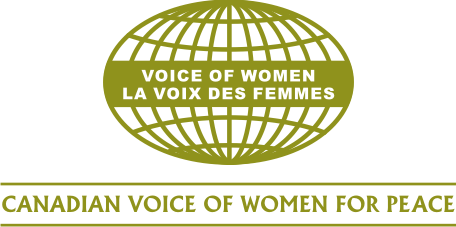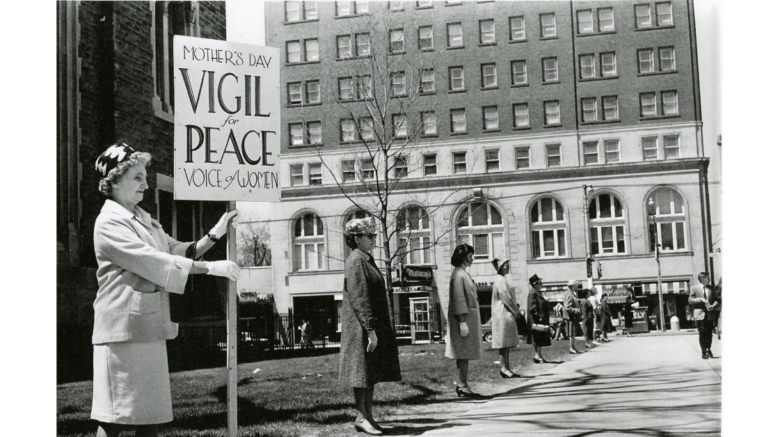By Hannah Hadikin (Co-Chair)
Although there are different accounts of when and how Mother’s Day began and although the dates paying tribute to mother’s differ from country to country, it is a day designated in honor of mothers, grandmothers, sisters, aunts, caregivers and all women and their supporters who have long championed peace around the world. Importantly, Mother’s Day began as a day to express solidarity with one another opposing wars that left widows and orphans impoverished. Various sources on the origins of Mother’s Day refer to Ann Reeves Jarvis in West Virginia, who in the 1850’s founded Mother’s Day work brigades to work at improving sanitary and health conditions, extending to prevent milk contamination with the goal of lowering infant mortality. In the 1860’s, Jarvis organized women’s groups to tend to the wounded soldiers during the Civil War. As a pacifist reaction to the carnage of the American Civil War and the Franco-Prussian War, in 1870 Julia Ward Howe issued her “Mother’s Day Proclamation” which became one of the early calls to celebrate Mother’s Day in the United States. “Mother’s Day” was mostly marked by women’s peace groups and mothers whose sons fought and died in the wars, who in a united voice, called for women to take an active political role in promoting peace. Jarvis’s daughter Anna, who never had children of her own, organized the first official Mother’s Day celebration in 1908 in memory of her mother. A force to contend with and through her relentless efforts , in 1914, U.S. President Woodrow Wilson, officially set aside the second Sunday for the celebration.
Anna Jarvis spent decades until the 1940’s defending the day from commercialization and ideological exploitation. She was deeply disturbed to see the day become a commercial gold mine, with the engine of consumerism at the helm. “Jarvis incorporated herself as the Mother’s Day International Association and tried to retain some control of the holiday. She organized boycotts, threatened lawsuits, and even attacked First Lady Eleanor Roosevelt for using Mother’s Day to raise funds for charities. The American War Mothers, which still exists, used Mother’s Day for fundraising, selling carnations. Anna resented that, so she crashed their 1925 convention in Philadelphia and was actually arrested for disturbing the peace.” (1)
She would be appalled to see how savvy marketers such as Hallmark, a private corporation based in Kanas City, Missouri, which sold its first Mother’s Day cards in the early 1920s, reporting that Mother’s Day is the number three holiday, behind Christmas and Valentine’s Day with profits in excess of $19 billion the U.S. alone. Mother’s Day is now one of the top three commercial holidays in Canada. Another apparent affront to the memory of the mother of Mother’s Day. Jarvis died in 1948 at the age of 84, penniless in a sanitarium in a state of dementia.
The twentieth century illuminated the realities of women’s lives. Mother’s work and service shifted for many women radically from the domestic sphere to the workplace. The roles of mothers encompassed not only the ‘’sacrifices within the home”, and unwaged domestic labour, but by extension to caregivers in communities, volunteers across all sectors, and often the economic sustainers of family units. Although caring work became more visible, with the designation as “essential”, without the economic recognition, women who work in this sector, for the most part remain in poverty.
Recently, COVID-19, has exposed the exploitive nature of care work, and how it is valued symbolically, but not in material value. The irony is that without this work, the whole world could not function. The return to ‘normal’ post- pandemic is no longer acceptable. Alliances across sectors must be built with the caring labour, upon a foundation of feminist principles and processes. It is critical that this struggle for equality does not fade into the status quo of inequality and exploitation
Mother’s Day historically symbolizes the deep connection between women and their work for sustainable peace. I can’t think of a greater honouring of our mothers and grandmothers than to continue advancing not only working for a peaceful and equitable world, but also to be the best stewards we can of the world that we’ve been entrusted to protect and preserve.
Resources:

